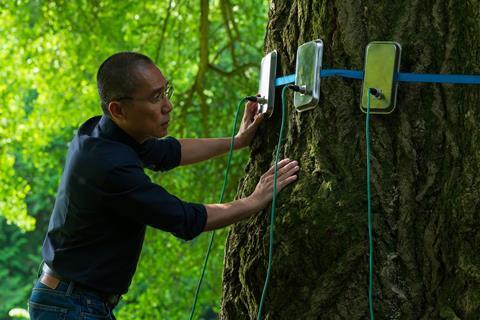Contemplative Venice Competition title weaves three human stories across a German university campus

Dir/scr: Ildiko Enyedi. Germany/Hungary/France. 2025. 147mins
No trees are actually hugged in Silent Friend, but arboreal adoration has never blossomed on screen as lushly as it does in this contemplative, nature-focused feature from Hungarian writer-director Ildiko Enyedi. Not so much a narrative-driven drama, this is more a contemplative reverie about people, plants, the world and their interconnections, anchored around an ancient ginko tree standing in the middle of a German botanical garden.
The real stars are the various flora that appear throughout
The human presence is fronted by Asian star Tony Leung Chiu-Wai, giving a quiet, charismatically stately performance, with cosmopolitan art-house queen Léa Seydoux contributing a small but vital role. Their presence should boost international interest in a film that, though hyper-aesthetic, could nevertheless appeal in an era of bestselling books about the secret lives of fungi and octopi. Following its Venice competition premiere, the latest film from Enyedi (who won Berlin’s Golden Bear for On Body And Soul in 2017) will play at Toronto, Busan and London, and could send out shoots even further.
The real stars, of course, are the various flora that appear throughout, their names (Mimosa pudica, et al) listed in the end credits as prominently as the human actors – although it´s the venerable ginkgo biloba that takes pride of place in the story. As for the humans, they appear over three different periods, in individual, alternating stories set on a German university campus.
Leung plays Tony, a Hong Kong neuroscientist researching the brains of babies. His arrival in Germany unfortunately coincides with Covid-19 lockdown, leaving him stranded and alone on the campus with its eerie, futuristic buildings. But it also allows him time to think, and to pursue new research interests – which lead him via Zoom to French botanist Alice (Seydoux), her theories prompting Tony to question the parallels between human and plant responses.
Tony´s story is interleaved with two students´ sojourns on the same campus decades earlier. One is Grete (Luna Wedler), a young woman whose determination to pursue botanical studies in 1908 is nearly thwarted by the antediluvian attitudes of the patriarchal professors who interview her for admission. One sees her very awareness of plant reproduction as the sign of an indecent mind, but Grete gets admission to the course.
The third key protagonist is 1970s shy young man Hannes (Enzo Brumm) who, raised on a farm, claims that he´s had enough of plants and only cares for literature. But he is distracted from his solitary Rilke-reading sessions by forthright botany student Gundula (Marlene Burow), who asks him to care for a geranium when she heads off on a field trip.
There are some pithy observations about human misunderstanding in the film, not least in the Hannes section: genuinely working-class, he´s mocked by the privileged bourgeois kids who regard him as insufficiently committed to the revolution. Further back, Grete´s battle for self-determination is sketched forcefully, albeit in less surprising terms. And in the present-day story, Tony´s attempts to investigate the giant ginkgo in the university grounds arouse suspicion from a caretaker (Sylvester Groth) who is uneasy at having to share his space with this quiet visitor from a distant country.
Enyedi previously mused on humanity´s relations to the natural world in On Body and Soul, and does it to more lavish effect here. DoP Gergely Palos contrives to shoot plants, the ginkgo especially, from every conceivable angle and distance. The film deploys a range of graphics and video techniques in the Leung section, including psychedelic bursts of vividly coloured light to map the electrochemical responses of plants and human brains. This section is shot digitally, contrasting with the chilly 35mm black and white of Grete´s section and the richly hued, rough-textured 16mm of the 70s episode. And while the three sections don’t tie up narratively, nor strictly conclude as such, they leave plenty of ideas in their wake – and a multitude of entrancing images.
Production companies: Pandora Film, Galatée Films, Inforg-M&M Film
International sales: Films Boutique contact@filmsboutique.com
Producers: Reinhard Brundig, Monica Mécs, Nicolas Elghozi, Meng Xie, Morgane Olivier
Cinematography: Gergely Palos
Production design: Imola Láng
Editing: Karoly Szalai
Music: Gabor Keresztes, Kristof Kelemen
Main cast: Tony Leung Chiu-wai, Luna Wedler, Enzo Brumm, Léa Seydoux
























